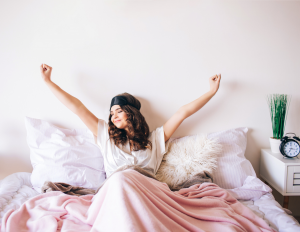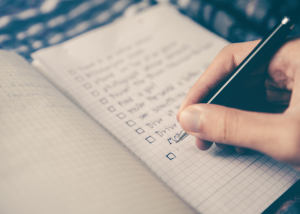When it comes to your health and wellness, developing a sleep routine plays a very important role. When my patients are struggling with feeling lethargic or are experiencing any chronic illnesses, sleep can often be one of the culprits. Here are some of the questions I make sure to ask:
- Are you getting at least 7 hours of sleep per night?
- Is your sleep uninterrupted?
- Do you feel well rested when you wake up in the morning?
- Are there things you are doing that may be disrupting your sleep?
Despite the fact that most of us recognize the importance of sleep and the impact it has on our overall wellbeing, people have a hard time making it a priority. Too many people are not getting enough rest in order to achieve their optimal health. Amidst the endless to-do lists, nonstop multi-tasking, and adulting responsibilities we are faced with on a daily basis, we must find a way to develop the proper sleeping habits.
Relax your way to feeling rejuvenated.
For those who are making a conscious effort to get a good 7 to 8 hours of sleep each night, I highly recommend getting an Oura ring to help determine the quality of rest you are actually getting. The Oura ring tracks your sleep patterns, heart rate variability, REM cycles, and things like that.
There are other products out there like the Whoop Band, Apple watches, or FitBits to help you gather sleep-related data. With more information, you’ll be able to make the right adjustments in order to get a proper night’s sleep and begin feeling your best sooner. In cases where my patients are having a hard time unwinding before bedtime, I found the following remedies to be very effective.
Sleep plays an important role in your physical health. It is involved in healing and repair of your heart and blood vessels. Ongoing sleep deficiency is linked to an increased risk of heart disease, kidney disease, high blood pressure, diabetes, and stroke.
Source: National Heart, Lung, And Blood Institute
Cheers to no alcohol before bedtime.
Having a drink late at night is known to disrupt sleep cycles. Just one glass of wine can keep you from getting the rest your mind and body needs to function at full capacity the next day. Limiting your alcohol intake will help you to get a better night’s sleep.
Say goodbye to late night sugar.
 Any sort of sweet or simple carbohydrate you eat close to bedtime is going to cause some glucose swings, leading to wake ups in the middle of the night. If you’re hungry and it’s later in the evening, I would suggest a small amount of food that is a mix of healthy fat and protein. The main goal should be to keep those blood sugars in check.
Any sort of sweet or simple carbohydrate you eat close to bedtime is going to cause some glucose swings, leading to wake ups in the middle of the night. If you’re hungry and it’s later in the evening, I would suggest a small amount of food that is a mix of healthy fat and protein. The main goal should be to keep those blood sugars in check.
Take an evening tech timeout.
Tempting as it might be to scroll through your Facebook newsfeed or catch up on emails before bed, studies have shown these devices can interfere with sleep by suppressing the production of melatonin, a natural hormone released in the evening to help you feel tired and ready for sleep. So put your phone down and step away from the devices. And if a scenario arises where screen time before bed is necessary, try wearing blue blocker glasses.
Implement a relaxation routine.
A nice, relaxing sleep routine will help you to get some quality shut eye. Avoid activities that are high energy or stress inducing. Instead, try things like taking a warm bath, reading a book, listening to calming music, enjoying a cup of tea, and doing some meditation. There is not one right answer. You just need to find what’s most feasible to maintain and works best for you.
Rise and shine without the struggle.
For some, it’s not the sleeping that’s the problem but the getting up in the morning that poses a challenge. Especially during the winter months, it can be tough to get up and out of bed. Investing in one of those 10,000 UV Lux lights (Verilux is a great brand) is well worth it.
When your alarm goes off in the morning, simply sit in front of the Lux light for 20 to 30 minutes. Be sure to keep your eyes open in order to achieve the desired cortisol awakening response. You’ll feel ready to get up and get the day started.
Lack of sleep is known to affect mood and emotional health, which may exacerbate the challenges posed by anxiety, depression, ADHD and more.
Source: The Sleep Foundation
Sleep is a beautiful thing.

At Omnia Health, we believe you deserve to feel your best. We are committed to being there for our patients, helping to strategize and implement plans that ensure everyone’s goals are met. Supporting others on their mission to lead healthier, happier, more fulfilling lives is what we do best.
Feel free to follow us on Instagram or Facebook {omniahealthcolorado} or join our newsletter for some tips and tricks on how to achieve optimal health and wellness. What are you waiting for? When it comes to making a change, there’s no better day than today. Give us a call to get started.









